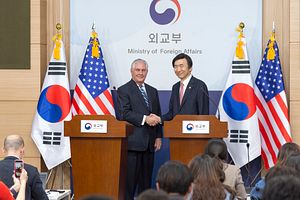U.S. Secretary of State Rex Tillerson called time on the Obama administration’s North Korea policy while offering little specific about a new White House strategy during a three-nation tour of Asia dominated by Pyongyang’s advancing nuclear and missile development.
Speaking in Tokyo on Thursday following a meeting with Japanese Foreign Minister Fumio Kishida, Tillerson said it was time for a “new approach” to North Korea after 20 years of diplomacy and incentives had failed to achieve nuclear disarmament, the New York Times reported.
The top American diplomat, whose first Asia trip came within a fortnight of North Korea launching four ballistic missiles into the Sea of Japan, also called for increased cooperation among Washington, Tokyo, and Seoul, a familiar refrain among American diplomats visiting the region. South Korea and China have typically had strained relations with Japan because of outstanding historical issues, while the relationship between the former countries has been uncharacteristically tense since Seoul green-lighted the deployment of an American anti-missile system that Beijing views as a threat to its security.
On the second leg of his trip, in Seoul, Tillerson on Friday struck his most hawkish tone yet, warning that military action against the North was possible — though preferably to be avoided — if the threat of its weapons programs reached a “level that we believe requires action.”
Tillerson, who met with caretaker government figures managing state affairs since the impeachment of former President Park Geun-hye, also declared the end of “strategic patience,” former President Obama’s policy of waiting out Pyongyang while upping sanctions, saying that various “diplomatic, security and economic measures” were on the table.
Meeting with Chinese Foreign Minister Wang Yi in Beijing on Saturday, hours after President Donald Trump slammed China on Twitter for doing little to help rein in Pyongyang, Tillerson was notably more diplomatic, echoing Chinese descriptions of U.S.-China ties while telling media the countries were determined to work together to convince Pyongyang to change course.
On Sunday, Tillerson met with Chinese President Xi Jinping, who is expected to have his first meeting with the U.S. president next month. Tillerson and the Chinese leader agreed on the potential for greater cooperation while acknowledging their countries’ differences, the State Department said.
While Tillerson’s trip emphasized a break with past thinking — and made some of the strongest hints yet of military action — it remains unclear if Trump, who has vacillated between suggesting direct talks and talking tough on the regime, will substantially alter U.S. policy on North Korea.
“Tillerson’s comments that all options are on the table, including the military option, were important for Beijing and Pyongyang to hear,” Anthony Ruggiero, a senior fellow at the Foundation for Defense of Democracies and former State Department official, told The Diplomat.
“The policy review is ongoing and the Trump-Xi meeting will provide another opportunity to state this administration’s policy. Trump should pursue robust new sanctions and vigorous implementation of existing sanctions, which should include action against Chinese companies and banks that allow North Korea to evade sanctions.”

































